A Treatise on Original Thought
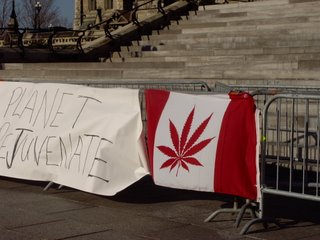 Subtitled: All students should be required to take a course in favour of plagarism.
Subtitled: All students should be required to take a course in favour of plagarism.
______________
"I had toward the poetic art a peculiar relation which was only practical after I had cherished in my mind for a long time a subject which possessed me, a model which inspired me, a predecessor who attracted me, until at length, after I had molded it." - Johann Wolfgang von Goethe
I started writing my book today.
________________________________________________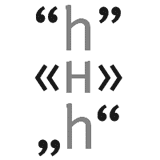
"A quotation at the right moment is like bread to the famished." - The Talmud
"Quotation is a good thing. There is a community of thought in it." - Samuel Johnson
"I always have a quotation for everything. It saves original thinking." - Dorothy L. Sayers
"A good quotation gets out the mental screwdriver and adjusts the setscrew." - Joan Larsen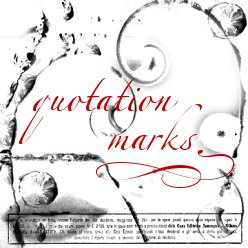 "Stronger than an army is a quotation whose time has come. " - W.I.E. Gates
"Stronger than an army is a quotation whose time has come. " - W.I.E. Gates
"The art of quotation requires more delicacy in the practice than those conceived who could see nothing more in a quotation than an extract." - Benjamin Disraeli
"I hate quotations. Tell me what you know." - Ralph Waldo Emerson
"Every book is a quotation, and every house is a quotation out of all forests and mines and stone quarries; and every man is a quotation from all his ancestors." - Ralph Waldo Emerson
"When one begins to live by habit and quotation, one has begun to stop living." - James Arthur Baldwin
"Life itself is a quotation. " - Jorge Luis Borges
"A fine quotation is a diamond in the hand of a wit, and a pebble in the hand of the fool." - Joseph Roux "Most people are other people. Their thoughts are someone else's opinions, their lives a mimicry, their passions a quotation." - Oscar Wilde
"Most people are other people. Their thoughts are someone else's opinions, their lives a mimicry, their passions a quotation." - Oscar Wilde
"Every quotation contributes something to the stability or enlargement of the language." - Samuel Johnson
"An apt quotation is like a lamp which flings its light over the whole sentence." - Letitia Landon
"Quotation, n: The art of repeating erroneously the words of another." - Ambrose Bierce
"I keep bumping into that silly quotation attributed to me that says 640K of memory is enough. There's never a citation; the quotation just floats like a rumour, repeated again and again." - Bill Gates
I didn't start with a quotation, I started with an exercise.
____________________________________________________
"It is common error to infer that things which are consecutive in order of time have necessarily the relation of cause and effect." - Jacob Bigelow
It won't be written in a linear sequence. I started with the middle chapter.
_____________________________________________________
"The product of mental labour --- science --- always stands far below its value, because the labour-time necessary to reproduce it has no relation at all to the labour-time required for its original production." - Karl Marx
It is the product of non-scientific mental labour, including the scientific subset.
_____________________________________________________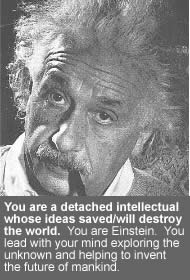
"The most evident difference [between higher animals and humans] springs from the important part which is played in man by a relatively strong power of imagination and by the capacity to think, aided as it is by language and other symbolic devices. Thought is the organizing factor in man, intersected by the casual, primary instincts and the resulting actions. In that way, imagination and intelligence enter into existence in the part of servants of the primary instincts. But their intervention makes our acts to serve ever less merely the immediate claims of our instincts." - Albert Einstein
Instinct gives birth to thought across the turbulent, chaotic threshold between the two, which gives a mirrored insight into instinct, thus growing "rightful", default instinctive behaviour into rightful, default thoughtful behaviour.
_____________________________________________________
(sent to me by e-mail from a friend and correspondent)
In a study on "the psychology of discovery and invention," drawing on analysis of high achievers in fields from science to diplomacy to the arts, the psychologist Mihaly Csikszentmihalyi defines creativity as the making of something genuinely new that is valued enough to be added to the culture. "Creativity doesn't happen in people's heads," writes Csikszentmihalyi, "but in the interaction between a person's thoughts and a socio-cultural context. It is a systemic rather than an individual phenomenon." Also, being creative isn't the same as being socially interesting or stimulating. "Some of the people who have had the greatest impact on history," Csikszentmihalyi writes, "did not show any originality or brilliance in their behavior except for the accomplishments they left behind -- neither Leonardo Da Vinci nor Isaac Newton nor Thomas Edison would have been assets at a party."
What, then distinguishes creative people? Csikszentmihalyi explains that one word best sums up what he has learned about them: complexity. "I mean," he writes, "that they show tendencies of thought and action that in most people are segregated." The prestigious creators he studied were both wild and subdued, rebellious and pragmatic, cooperative and aggressive. Crucially, Csikszentmihalyi observes, they found ways to use these extremes to their advantage -- for instance, trusting their intuition to make novel connections in language or imagery, and then trusting others to edit and publish their work.
Research on the mental health of creative people shows another angle of this complexity. The idea of the tortured genius is simplistic, insofar as it suggests that being tortured, by itself, is worth anything. As the psychiatrist Kay Redfield Jamison writes, "There is a great deal of evidence to suggest that, compared to 'normal' individuals, artists, writers, and creative people in general are both psychologically 'sicker' -- that is, they score higher on a wide variety of measures of psychopathology -- and psychologically healthier (for example, they show quite elevated scores on measures of self-confidence and ego strength)."
To elaborate on "sicker": numerous studies have shown that rates of mood disorders are far higher among artists than the overall population. One in-depth study of 113 German artists found rates of "abnormality" much higher than in the general public -- fifty percent of the poets in the group had clinically significant mental trouble. Another well-known study, led by Nancy Andreasen, used structured interviews and matched control groups to examine thirty writers at the prestigious University of Iowa Writers' Workshop. Eighty percent of the writers met formal criteria for a major mood disorder, compared with thirty percent of controls matched for age, education, and sex.
Modern researchers have identified one or more major mood disorders in John Quincy Adams, Charles Darwin, Emily Dickinson, Benjamin Disraeli, William James, William Tecumseh Sherman, Robert Schumann, Leo Tolstoy, Queen Victoria, and many others. We may accurately call these luminaries "mentally ill," a label that has some use insofar as it indicates the depth, severity, and quality of their trouble. However, if we get stuck on the label, we may miss the core fascination, which is how illness can coexist with marvelous well-being.
Descriptors such as sicker, abnormal, creative, social, unresponsive, popular are exactly synonymous with "different" and "unique", except the latter two replace the element of implied judgement with non-judgemental unbiased comparison.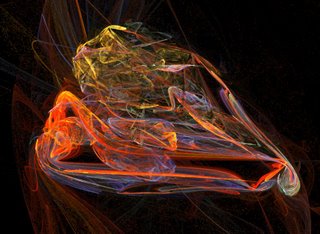
"I've learned that people don't want advice, but understanding." - Age 40












Post a Comment